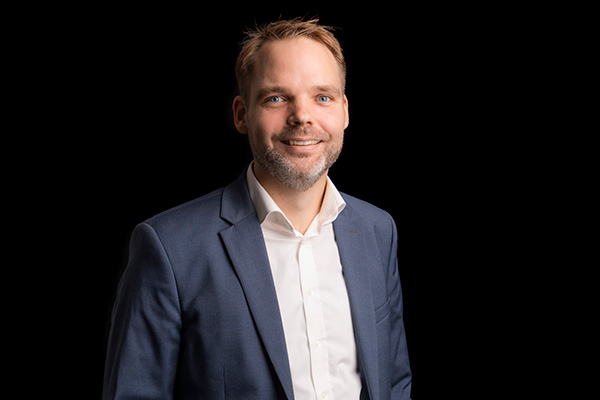Erwin M. Schoof
Research leader

Project title
Leveraging advanced sample preparation strategies towards integrative single-cell multi-omics
What is your project about?
The properties of multicellular organisms, organs, tumors and even microbial biofilms or fungal communities are defined by a complex interplay of individual cells. To add to this complexity, cell function is dynamically controlled at multiple molecular levels (e.g. DNA, RNA and proteins). Thus, to fully capture biological complexity, and effectively treat complex diseases such as cancer, diabetes or Alzheimer’s, we need to resolve cell signaling mechanisms at the single-cell level and across all three molecular levels. While single-cell technologies focusing on RNA, and very recently also proteins, have undergone a revolution, technologies allowing the unbiased measurement of both RNA and proteins at the same time, from the very same cells, have remained elusive. This project aims to develop technologies that enable these joint analyses, and with high throughput, for the very first time.
How did you become interested in your particular field of research?
I have always believed that a combination of experimental and computational analysis is essential to properly explain biological phenomena. My overall research goal is to develop and apply methods to understand how cell diversity, and the molecular landscapes thereof, contribute to complex biological phenotypes. As the main molecular effectors, proteins play a critical role in defining cell function, and thus the quantitative exploration of protein signaling has been a major driving force of my academic career. However, the more we learn, the more we realize the complexity of biology and how we need to embrace the necessary integration of multiple technologies and computational analysis to truly understand biological phenomena. This is the fundamental driving force behind my newly established research group, the “Cell Diversity Lab”.
What are the scientific challenges and perspectives in your project?
Conducting molecular studies on single cells is challenged by the extremely limited amount of sample we have to work with. Cell handling is the first challenge, followed by cell lysis and then the respective sample preparation workflows for the various molecular assays (genome sequencing, proteomics by Mass Spectrometry etc.). In all cases, sample loss needs to be kept to an absolute minimum, while relying on automation for increased sample throughput and reproducibility. For multi-omic studies, these challenges are amplified even further, which we aim to overcome by means of functionalized magnetic beads and digital microfluidic platforms. Integrating the resulting data also poses several challenges, which we will tackle using computational machine learning frameworks together with my collaborative network around the world.
What is your estimate of the impact, which your project may have to society in the long term?
Here, my group will develop fully-fledged experimental and computational workflows for simultaneous measurement of RNA and protein in single cells. We will, for the first time, be able to understand relationships between RNA and proteins in single cells, and discover which biological processes are transcriptionally regulated versus those controlled post-translationally. I am certain that these approaches will result in technologies with major impact on fundamental molecular biology, and will lead to novel insights into stem cell differentiation (e.g. tissue repair), production cell engineering, and eventually, dissecting complex microbial interactions such as bacteria and fungi. Moreover, I expect to be able to generate molecular signatures that will have translational impact in terms of disease detection and early measurement of treatment response.
Which impact do you expect the Sapere Aude programme will have on your career as a researcher?
Single-cell molecular analysis is still in its relatively early days. We continue to strive for much-needed technological improvements and this Sapere Aude grant will be essential to both mature existing protein-level technologies, and establish novel methods that enable the integration of information about proteins, RNA, and eventually DNA from the very same cells. Besides the much-needed manpower and running costs for the lab, I expect the prestige of getting a startup grant to open future doors that will help continue developing my academic career. I look forward to interacting with this network of Denmark’s brightest young researchers and hope to establish long-lasting collaborations across all life science domains.
Background and personal life
Outside of work, I am the proud father of one and enjoy life with my Danish wife who is a researcher in industry. I enjoy road biking, running, boxing and hiking. For the latter, my family appreciates traveling to the alps, where I also spent many of my summers as a child. I am originally from the Netherlands, I have enjoyed living in many different countries, but am happy to settle down in a wonderful and dynamic place such as Denmark.
View all research leaders here
Research institution
Technical University of Denmark
Research field
Systems Biology
City of your current residence
Furesø
High school
Leipzig International School, Germany
